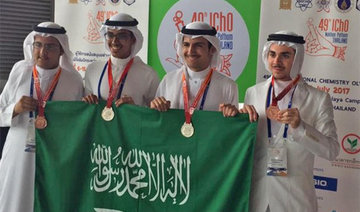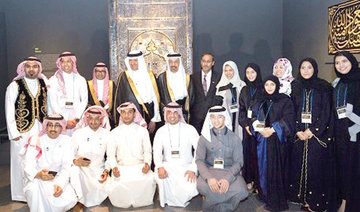RIYADH: The new academic year 2017-18 kicked off on Sunday with more than 6 million students in different levels of public education attending the first day of classes all over the Kingdom.
More than half-a-million teachers were on hand to welcome the students and ensure an orderly educational process.
In the Saudi capital, Minister of Education Ahmed Al-Issa visited two schools on the first day of classes, expressing pleasure over the level of attendance and readiness on the first day of the academic year. At the Al-Mughira School, he inaugurated a program for first-grade students.
He said Saudi Arabia deserves schools and universities that will prepare students to compete at the “world level.”
“Our country deserves to have an advanced educational system enjoying creative capacities (and) bright minds ... to provide the best opportunities to our sons and daughters to enable them compete,” he said.
The minister said students should commit to Islamic teachings and community values, preserve Saudi Arabia’s achievements and work hand-in-hand with teachers and other students.
He also lauded the role of families in making the work of schools and universities a success.
Moreover, teachers and students worked with the Department of Traffic in the Riyadh region on traffic awareness by distributing roses and leaflets.
Officers and staff of the department were deployed at many intersections and roads to guide drivers and passengers in compliance with traffic regulations.
In Qassim, more than 186,000 students trooped off to 1,726 schools for boys and girls at the kindergarten, primary, intermediate and secondary levels.
The first day of classes was characterized by a “disciplined start in the early hours of the first school day.” The highest degree of readiness was achieved after a series of preparatory meetings.
Director General of Qassim Education Abdullah bin Ibrahim Al-Rukayan, also the head of the school preparedness committee, chaired a number of meetings in connection with the current academic year.
In Asir, 46,000 students attended the first day of classes, with Prince Mansour bin Muqrin bin Abdul Aziz, deputy governor of the Asir region, saying that teachers carry a noble message and play an important role in the education of young people.
He attended the first day of classes at an elementary school in Abha, in the presence of Asir Director General of Education Jalawi bin Mohammed Al-Karkman, who said that ten school buildings have been completed in conjunction with the beginning of the new academic year.
He said that the buildings will contribute to the reduction of rented buildings and provide an attractive environment for the employees and teachers in general, and students in particular.
More than 15,000 teachers attended a series of training programs, most notably on Canadian experiences in education, the skills required for new teachers, and reading proficiency, evaluation methods, among others.
Over 6m students head to schools as classes kick off in Saudi Arabia
Over 6m students head to schools as classes kick off in Saudi Arabia

What’s the matcha with everyone? The beloved green tea powder hits mainstream in Saudi Arabia

- The Japanese tea’s rise in the Kingdom is a cultural shift, one green cup at a time
RIYADH: Once a niche ceremonial tea in Japan, matcha is now gaining mainstream popularity in Saudi Arabia, thanks to a growing interest in wellness trends, evolving taste preferences, and the rise of mindful living.
The data backs the trend. According to a recent report by IMARC Group, Saudi Arabia’s green tea market, which includes matcha, was valued at $140.14 million and is projected to grow to $229.24 million by 2033.
Imports of packaged green tea nearly doubled in value between 2020 and 2023, suggesting a growing appetite for premium, health-focused drinks.
That growing demand is reflected on cafe menus and social media feeds across the Kingdom. Matcha lattes, once limited to specialty coffee shops, are now a fixture at trendy cafes and home kitchens alike.
Whether it’s served iced in sleek glass cups or whisked at home with oat milk, matcha is more than a drink. It’s a mood, a personal statement, and for many, a healthier way to start the day.
In Dammam, 19-year-old Sara Anas remembers her first taste of matcha back in 2019. “My dad likes trying new things,” she said. “It didn’t taste that great at first, but when matcha became popular in 2021, I got excited to try it again from local cafes.”
Now, she drinks it almost daily. “It might sound strange, but I don’t feel like it’s heavy on my body like coffee. It makes me feel more relaxed and gives me energy in a better way.”
Anas is part of a growing demographic. In Riyadh, 26-year-old Amal Al-Mutairi starts every morning with matcha. “I prefer it iced with vanilla milk to make the flavor smoother and lighter,” she said.
For her, the appeal began with reading about its benefits. “It gives me calm energy without the jitters or crash I usually feel after drinking coffee. It also helps me focus for longer periods.”
That calm, focused energy — often described as a “cleaner” caffeine experience — has made matcha especially popular among students and professionals.
For Anas, it’s a campus essential. “It’s a must before classes! It gives me the energy to continue my day at uni,” she said.
But matcha is more than functional. It’s become a lifestyle, embraced for both its wellness claims and its visual charm.
Globally, matcha’s rise is part of a broader wellness boom. Japan’s matcha production rose 185 percent from 2010 to 2023, and demand is now so high that suppliers are warning of shortages. Japan’s top growers have begun limiting exports to meet domestic needs.
Matcha’s health appeal is not just hype. Rich in antioxidants — especially a compound called EGCG — studies suggest it may reduce inflammation, support cardiovascular health, and aid cognitive function.
A recent Saudi study also found that over half of the participants believed matcha could help with weight management and blood sugar balance.
Still, experts note that moderation matters. Excessive matcha consumption may interfere with iron absorption and isn’t recommended for everyone.
The ritual of preparing matcha, especially for those who make it themselves, has become part of a broader shift toward slow, intentional living — something many young Saudis are leaning into.
That ritual is deeply personal for 27-year-old Leen Al-Zamil, who turned matcha from curiosity into a daily indulgence. “I was curious at first and honestly, I hated it so much, but I think (that’s) because it was hot,” she said. “I liked it cold with vanilla syrup and oat milk. I definitely can’t drink it alone.”
Now, she can’t go a day without it. “Sometimes twice or more,” she said. “I like its color … I enjoy every step of making it, and it just tastes so good. It brightens my mood.”
Al-Zamil is not the only one who sees matcha as more than just a drink.
For 28-year-old Mona Abdullah, matcha represents healing. “As someone who suffers from IBS, coffee tends to affect me for a while, whereas matcha provides steady energy without causing any discomfort,” she said. “I’ve stopped drinking coffee for the past three months. I now believe that matcha is a better source of caffeine compared to black coffee.”
Irritable bowel syndrome is a common digestive condition. Many people with IBS find that coffee, with its acidity and high caffeine content, can trigger discomfort, making gentler alternatives like matcha a preferred choice.
Abdullah drinks it twice a day, iced, and without any added flavors. “Health,” she says, is what made her switch.
Still, matcha’s appeal goes beyond health — it’s also about aesthetics and culture. “I think it’s a mix of everything,” said Al-Mutairi. “The health benefits, the taste, and yes, the aesthetic.”
Anas echoed that idea, noting that people’s motivations vary. “For me, it’s for its health benefits and for the taste. You don’t usually get a healthy drink with a good taste,” she said. “But I think there are a lot of people who drink it just for the aesthetic. You see them adding hundreds of syrups just to say they drink matcha.”
That blend of wellness and image — serious health meets playful branding — has fueled matcha’s surge on social media. With its bright green hue, minimalist packaging, and frequent cameos in cafe selfies, matcha has become the drink of the “soft life” movement, one that prioritizes peace, balance, and pleasure.
“It’s definitely the vibe and the taste,” said Al-Zamil.
In a country where coffee culture runs deep, matcha is not replacing tradition; it’s offering something new: a blend of taste, lifestyle, and personal meaning, one bright green cup at a time.
GCC chief receives newly appointed Omani ambassador to Saudi Arabia

Secretary-General of the Gulf Cooperation Council Jasem Mohamed Albudaiwi received Sayyid Najib bin Hilal Al-Busaidi, Oman’s newly appointed ambassador to Saudi Arabia, in Riyadh on Tuesday.
Albudaiwi congratulated Al-Busaidi on his appointment and wished him success in his duties.
The parties discussed various topics and explored ways to enhance bilateral efforts toward “greater integration, solidarity, and interconnectedness.”
They also looked at the latest developments in regional and international arenas.
Riyadh hospital advances breast tumor diagnosis

- The new CEM-guided approach allows immediate, accurate tissue sampling during the same session, eliminating the need for additional appointments
RIYADH: The King Faisal Specialist Hospital and Research Center in Riyadh has implemented an advanced interventional technique to diagnose breast tumors that conventional imaging cannot detect.
It enables physicians to obtain precise biopsy samples during the same visit, accelerating diagnosis and allowing earlier treatment, the Saudi Press Agency reported.
The shift addresses recent cases where certain breast abnormalities were only visible through contrast-enhanced imaging, leading the hospital to adopt contrast-enhanced mammography as a precise clinical tool.
Previously, the standard protocol required a separate MRI-guided biopsy after initial imaging, often resulting in redundant procedures, greater patient burden, higher costs and treatment delays.
In contrast, the new CEM-guided approach allows immediate, accurate tissue sampling during the same session, eliminating the need for additional appointments.
Saudi crown prince receives phone call from Iraqi PM

RIYADH: Saudi Arabia’s Crown Prince Mohammed bin Salman received a phone call from Iraqi Prime Minister Mohammed Shia Al-Sudani on Tuesday.
During the call, they reviewed relations between their countries and ways to strengthen them in various fields, Saudi Press Agency reported.
Bangladeshi leader sends letter to Saudi crown prince about bilateral relations

RIYADH: Saudi Crown Prince Mohammed bin Salman received a letter on Tuesday from the head of Bangladesh’s interim government, Muhammad Yunus.
The Bangladeshi ambassador to the Kingdom, Delwar Hossain, presented the letter, which addressed relations between Riyadh and Dhaka, to Deputy Foreign Minister Waleed Al-Khuraiji.
During their meeting in Riyadh on Tuesday, the envoy and the deputy minister discussed ways to strengthen ties between their countries in various sectors.





















